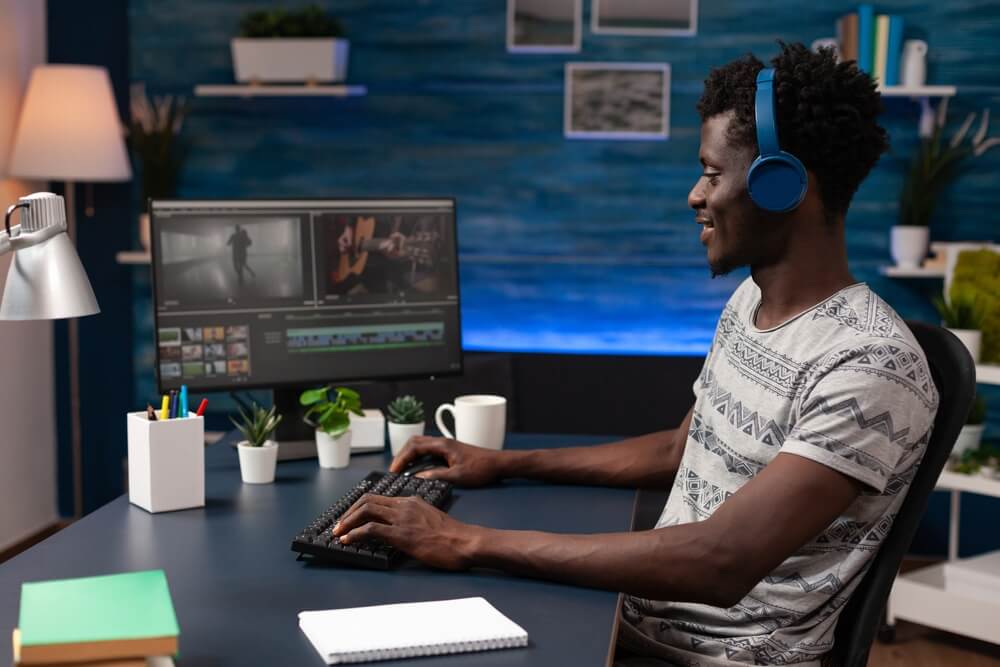What is a VFX Artist?
A Visual Effects Artist (VFX Artist) utilises computer software to generate animation and special effects that seem realistic but are impractical, risky, costly, or impossible to film.
VFX (visual effects) is the practice of integrating computer-generated imagery (CGI) with live-action video footage to create sequences that would not otherwise be feasible, or to repair, stylise, or modify the material for artistic or corrective purposes. VFX is used in almost every sort of film and television production. It necessitates a blend of creative and technical abilities, as well as a keen eye for detail. The basic classification for VFX Artists consists of two specific work orientations:
Someone who specialises in a specific field, such as 3D modelling, animation, or concept art. VFX Specialists are typically seen working in bigger studios with other specialists to achieve a shared aim.
Someone who is capable of doing a little bit of everything. Generalists typically operate alone or in small groups. They are frequently in charge of developing every aspect of a VFX shot from start to finish.
A career in visual effects might be demanding, but it can also be extremely rewarding. If you want to work in one of the fastest-growing sectors of the twenty-first century, there is no better time than now.
Responsibilities
Your responsibilities as a VFX Artist will depend on factors like the company you work for, job orientation and specific tasks of your project.
Some of the general VFX Artist responsibilities include:
- Creating storyboards that demonstrate how and when visual effects are required.
- Using software to design characters and visual components for films, television programs, and other media.
- Keep a detailed record of your progress
- Working with directors and other artists to grasp the broader concept.
- Communicating information swiftly and clearly to crew and other departments.
- Creating mockups for directors and film editors to assess.
- Acting as liaisons with the production crew.
- Organising daily reports, rounds, and meetings, taking notes and following up as needed.
- Supervising visual effects projects.
- Managing VFX Artist teams.
Salary
Visual Effects Artists' annual salaries in the UK typically start at £20,000 and rise based on their level of expertise and the intricacy of the job.
Rates may also vary depending on who is employing you–more established IT or animation firms tend to pay more. The average salary for a VFX Artist in the UK amounts to £32,465 and can grow up to £52,000. The average salary for a VFX Artist in London is £34,954 in London, ranging from £34,954 to £57,000.
Working hours and work location
Working as a Visual Effects Artist typically entails spending a significant amount of time in front of a computer screen. Some VFX Artists work from 9 a.m. to 5 p.m., while others work overnight to ensure that the team’s process runs well. Completing projects may involve working on weekends and holidays with significant overtime.
What to expect
The majority of VFX Artists are freelancers, which means they work for a variety of customers. Others work at film studios or design firms. VFX Artists collaborate with all other members of the art department, including concept artists, modelling artists, texturing artists, and so on. Typically, they report to the art director. The film industry is mainly centred around London, but there are some smaller indie firms in towns and cities around the UK.
In this role, you may also need to know programming languages like C++ and Python.
Qualifications
A Bachelor’s degree in art, graphics, or animation will be beneficial, but it is not required if you have an amazing portfolio. With the various free software programs accessible, you can teach yourself a lot at home. However, a degree in one of the following areas can help you land some of the most prestigious and best-paid jobs:
- Mathematics
- Information Technologies
- Physics
- Art

Skills
Your skillset will be determined by the task that you are completing. Generally, as a VFX Artist, you will be expected to possess or acquire the following skills:
must have skills:
- Drawing skills
- Mechanics and Movement knowledge
- Sculpture and Anatomy knowledge
- Visual Aesthetics skills
- Composition and Light knowledge
- Photography knowledge
- Cooperating
- Innovative approach skills
- Problem-solving skills
- Research skills
- Attention to detail
- Initiative
- Interpersonal skills
- Lateral thinking skills
- Ability to work independently and within a team
- Time management
Work experience
Employers may consider applicants without formal qualifications if they can demonstrate industry expertise and experience. Others may be able to enter this profession by other paths, such as becoming a Runner.
As a Runner, you would be responsible for a number of responsibilities such as organising meetings, delivering messages across departments, and answering phones – in general, you would be responsible for ensuring that everyone on the team had what they needed. This position would allow you to exhibit your versatility and excitement about working in this field.
VFX Artists frequently hold Higher National Diplomas and degrees in fields such as:
- Visual Arts subjects – Animation, design, illustration
- Computer science
It is beneficial to have a portfolio/showreel showcasing your talents and expertise via any work or projects you have done in order to show off your abilities and inventiveness for the position of VFX Artist – include your finest work and keep it up to date. Follow these steps to realise your ambition of becoming a VFX Artist a reality:
- Acquire software and technological knowledge.
- Put together a portfolio of your work.
- Read blogs, participate in online groups, and network with industry leaders.
There are several paths to being qualified for this position, including college, university, and work-based certifications such as apprenticeships. Because technology is always evolving, it is critical to stay current on improvements in software and hardware, as well as trends and approaches utilised in the business, throughout your career.
There are numerous free tutorials and online resources available concerning the technologies employed. In order to improve your chances of employment, you should check out the UK Screen Alliance. They are a trade group that covers animation, post-production, visual effects, physical special effects, audio, camera, and lighting hire, freelance talent agencies, and television and film studios. UK Studio Screen Alliance works in collaboration with the Animation UK,
Career prospects
Visual Effects Artists can have a great career and also a very high salary, which is the most attractive part of this profession.
There are currently 52 VFX studios employing between 2,433 and 9,887 people. According to the Animation UK research, the UK’s VFX business adds more than £1 billion to the UK economy. UK is home to a significant cluster of award-winning VFX companies that have contributed to international blockbusters like:
- Fantastic Beasts
- The Crown
- The Martian
- Ex Machina
- Florence Foster Jenkins
- Suffragette
- Guardians of the Galaxy.
The emergence of a new breed of boutique VFX firms such as Bluebolt, Union, One of Us, and Milk has been fueled by the established reputations of studios like Framestore, DNEG, MPC, The Mill, and Cinesite.
When pursuing a career in VFX ART you can also consider related careers like:
- Computer animator – The animator’s role is to bring CG components to life by directing the realistic movement of objects, animals, or effects in a scene. That animator would direct the wispy movements of a wizard’s spell in a fantasy picture. While the animation isn’t technically VFX, it is a vital component of the VFX workflow.
- Modelling Artist – Modelling artists are in charge of creating the 3D pieces that will be incorporated into a scene. This contains everything from automobiles and houses to fascinating monsters and futuristic weaponry.
- Video game designer – A video game designer creates practically every aspect of a game, including the storyline, characters, graphic designs, and layouts. Designers collaborate with several teams to develop a unified vision.
- 3D modeller – 3D modellers create 3D characters and environments based on concept art. They paint and wrap 2D textures over a digital frame to produce the models’ surfaces or skins. Character skeletons are also created by modellers and animated by animators.
VFX Artist is a technical position that is often not entry-level. Most VFX Artists begin their careers as Game Artists before specialising in visual effects. Typically, a compositor, rotoscope artist, match mover, or other fields of motion graphics and game art leads to a career in VFX. Some VFX Artists work at VFX companies for cinema and television before transitioning into gaming VFX.
Related Courses
The University of the West of Scotland teaches this program at their London Campus, so you’ll be studying at the heart of the UK’s VFX industry. This one-year, full-time curriculum is for students who have no prior expertise with computers or information technology. The course will help you learn much-needed IT expertise to help you prepare for a job as a VFX Artist.
FAQ Summary
A Visual Effects Artist (VFX Artist) utilises computer software to generate animation and special effects that seem realistic but are impractical, risky, costly, or impossible to film.
Visual Effects Artists’ annual salaries in the UK typically start at £20,000 and rise based on their level of expertise and the intricacy of the job. Rates may also vary depending on who is employing you–more established IT or animation firms tend to pay more.
A Bachelor’s degree in art, graphics, or animation will be beneficial, but it is not required if you have an amazing portfolio. With the various free software programs accessible, you can teach yourself a lot at home.





